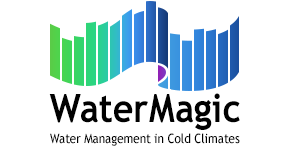Project background
All seven partners are situated in six countries in the High North, and have Water Management related graduate subjects, MSc & PhD and other research work. Several High North related issues are addressed in existing curricula, but only sporadically and incomprehensively. Water Magic has an ambition to review all resources and develop a comprehensive module to be shared among partners.
Although all 7 partners are among the nationally (some also internationally) leading universities on teaching and research on Water Magic issues, there has been no collaboration among them in the field so far. Water Magic will develop a solid collaborating network through the proposed workshops, teamwork, student exchanges and brainstorming session, which will continue to develop beyond the project period.
The challenges in Cold Climates will become even more demanding and complexed with the impacts of Climate Change. Bigger challenges require more efficient, economical and smarter solutions. To realise them a collaboration among universities, end-users (utilities) and suppliers (SMEs) is needed and it is a focus area of the Water Magic
Need for the project
Water resources management, water supply and wastewater treatment face special challenges in the High North due to the natural climatic conditions. Frozen water resources, highly variable surface overflows and influents to treatment utilities, the need to build larger treatment infrastructure and challenges in achieving treatment targets due to decreased efficiencies in winters are examples of such conditions.
The challenges will be even more severe with Climate Change impacts, further exemplified by e.g. more rain in shorter periods leading to flash floods and increased discharges, and increase in colour (NOM) in natural waters requiring improved treatment facilities. The engineers and researches of the future produced by Partner universities must be well educated in these issues to meet tomorrow’s challenges in the High North.
All seven partners of the “Water Magic” project have MSc and PhD programs/subjects in water management issues. They also carry out research on the theme in a variety of issues independently of each other. Preliminary discussions revealed both the need and rationale for a collaboration where knowledge is shared to solve common technical challenges in the field and teaching that are sporadically addressing the High North issues on water. The proposed new teaching module with teaching materials will therefore provide a solid foundation to prepare graduates addressing the challenges noted in the previous paragraph.
To meet the challenges of tomorrow in the High North water sector, it is also crucial to stimulate innovative technical solutions that are efficient and economical. Joint research among the research groups in five countries tuned to the needs and priorities of the utilities who are end-users, and the SMEs that will be converting innovations in to sustainable products and solutions, are invaluable steps in this process.

